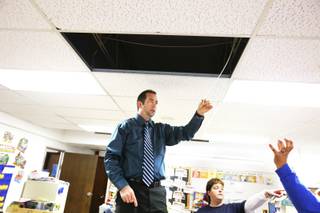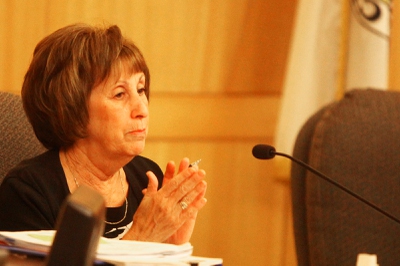Published Tuesday, Aug. 7, 2012 | 2 a.m.
Updated Wednesday, Aug. 8, 2012 | 7:08 p.m.
Archive
- School Board raises concerns about costly, unchecked change orders on construction, renovations (7-11-2012)
- School District to ask voters to OK six-year property tax increase for repairs and renovations (5-2-2012)
- Majority of county voters favor tax hike to fix schools, survey says (4-27-2012)
- $5.3 billion school bond proposal still in works; former first ladies stand ready to give support (4-12-2012)
- District weighs property tax hike to repair, modernize schools (2-10-2012)
- School district finding it harder to put off desperately needed repairs (12-19-2011)
A local libertarian think tank has sued the Clark County School District in what some say is an apparent attempt to derail the district’s ballot initiative to raise taxes for school maintenance.
The Nevada Policy Research Institute filed a complaint with the 8th Judicial District Court on Friday alleging the Clark County Debt Management Commission violated the Nevada Open Meeting Law.
The commission — composed of three Clark County commissioners and representatives from local city governments and the School Board — voted during its June 7 meeting to approve a ballot question that seeks voter approval on a new property tax to fund school construction and rehabilitation projects.
The cash-strapped School District is pursuing a new capital improvement plan to address $5.3 billion in school maintenance needs over the next decade. The School Board — supported by four former first ladies of Nevada — are pushing for a six-year capital levy that is expected to raise property taxes as much as $74 a year on a home with an assessed valuation of $100,000.
NPRI’s lawsuit alleges the debt management commission failed to take public comment prior to approving the ballot measure, thereby violating the open-meeting law and invalidating any action taken during the meeting.
The lawsuit — filed by NPRI and one of its researchers Karen Gray, who attended the June 7 meeting — claims the violation voids the commission’s decision to place the tax hike proposal on the November ballot.
“This action should be declared void by this Court and enjoined from placement on the November 2012 ballot … and/or nullify any elective vote taken,” the lawsuit reads.
If the Attorney General’s Office finds a violation of the open-meeting law, the item may come back for a re-vote, said Barry Smith, president of the Nevada Press Association, who has worked in-depth on open-meeting law issues.
“Often the remedy for an open-meeting law violation is a do-over of the meeting,” Smith said. “You have to follow the rules and the rules say you need to have public comment.”
However, because the deadline to submit and approve ballot initiatives in the November general election has passed, it is unknown whether the lawsuit now jeopardizes the School District’s ballot measure.
Clark County Registrar of Voters Larry Lomax said the matter will have to be resolved in the courts soon, as the election department is preparing to start printing upwards of 750,000 sample ballots next week to be sent out to voters this fall. Ballots are being prepared this far in advance, because overseas ballots much be sent out before Sept. 21, Lomax said.
The open-meeting law was revised in 2011 to require that public comment be taken before any action. Previously, some boards and commissions took public comments after a decision had been made.
The minutes of the June 7 meeting of the debt management commission were not immediately available online to determine if and when an opportunity for public comment was made available to constituents.
However, Clark County Commissioner Susan Brager — who has chaired the debt management commission for at least four years — said she remembers “so emphatically” that she turned to look at Gray during the June 7 meeting and asked her if she had any public comments.
“I’m very religious about doing it,” Brager said, adamant about making it a habit of asking for public comment during her meetings. “I think it’s very important the public should have a voice.”
Gray declined to comment on Tuesday.
County Commissioner Steve Sisolak — who is vice chairman of the debt management commission — also said he remembers Brager asking for public comment during the meeting. The commission usually takes public comments at the beginning and at the end of meetings, Sisolak said.
“My recollection of the meeting is that public comment was called for and there was none so we moved on,” Sisolak said, adding it is rare for members of the public to comment during commission meetings.
Regardless of whether there was a violation of the open-meeting law, some School District officials saw NPRI’s lawsuit as a politically motivated attack on the district’s major initiative to address some of its aging school buildings.
Since the recession, key repairs and renovations have been put off, raising concerns by School Board members about the safety of children in classrooms. At some of the district’s oldest schools, roofs leak, floors flood and air conditioning units regularly break down, officials said.
Joyce Haldeman, the School District’s associate superintendent of community and government relations, had worked on the district’s 1998 bond initiative that built more than 100 schools over the past decade. Haldeman, who is now overseeing the district’s proposed capital improvement plan, questioned NPRI’s motive in filing the lawsuit.
Suspect is the timing of NPRI’s lawsuit, which came just five days shy of the 60-day deadline to file a complaint on open-meeting law violations, Haldeman said. The deadline for filing questions to be placed on the November ballot was July 16, Lomax said.
“If (NPRI) were really interested in the open-meeting law, why would they wait until now to file this lawsuit?” Haldeman said. “It sounds to me like a political maneuver.”
Although NPRI spokesman Victor Joecks has publicly questioned the ballot measure in the past, NPRI attorney Joseph Becker maintained the lawsuit was not a political move to erase the tax initiative from the ballot.
"This is about the open meeting law and government transparency," Becker said on Wednesday. "It has nothing to do with the ballot question."
Becker declined to comment on the timing of NPRI's lawsuit, however.
"I'm not going to talk about that," he said. "The statute gives us 60 days to file and we met that deadline."
Brager — who was a School Board member for 12 years — said the commission will hear the ballot initiative again in August to conduct a re-vote “in an abundance of caution.” Both Brager and Haldeman said they were confident the lawsuit would not impact the ballot measure in November.
Lomax was not so sure. The local registrar of voters said it's common for the election department to be hindered by political battles — sometimes over legal technicalities — on ballot questions.
"It's business as usual," Lomax said. "These kinds of things seem to happen every election and we're always trying to scramble at the end (to print ballots)."
School Board President Linda Young, who sits on the debt management commission, said Tuesday that she respects NPRI and its right to challenge the School District on issues of government transparency. (She too said that Brager has been "conscientious" about asking for public comment during commission meetings.)
However — although she wouldn't speculate on NPRI's motive — Young said she was concerned about taxpayer dollars being diverted from the classroom to fight NPRI's lawsuit.
"We don't have those funds for extraneous things that don't benefit students," Young said. "Anything that takes away from education of students is concerning."
Furthermore, Young said the intent of the School District’s ballot initiative is to allow voters to decide whether or not they support a tax increase to fund school upkeep. Although she understands the tough economic times, Young said the capital improvement plan was a worthwhile investment.
"It's absolutely critical," Young said. "We have so many needs. Some of our schools are literally falling apart.
"This isn't whistling in the wind, let's go get some money from people," she continued. "It's a dire emergency. We have to do something or we're going to have to shut down some schools. Let’s present this issue to the public and let the voters decide."



Join the Discussion:
Check this out for a full explanation of our conversion to the LiveFyre commenting system and instructions on how to sign up for an account.
Full comments policy